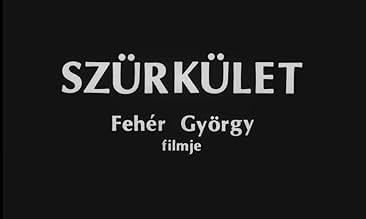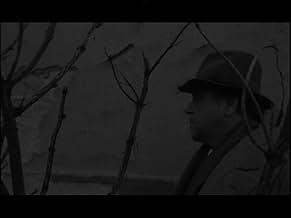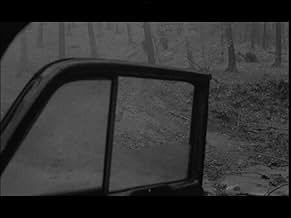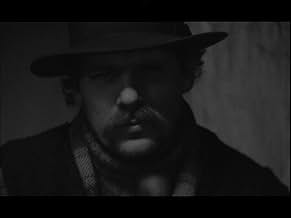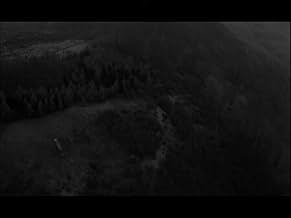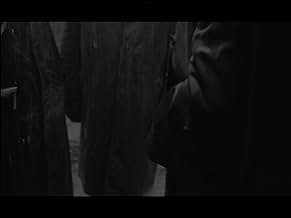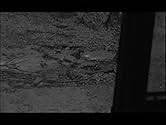Szürkület
- 1990
- 1h 45min
CALIFICACIÓN DE IMDb
7.2/10
1.3 k
TU CALIFICACIÓN
Agrega una trama en tu idiomaWhen a schoolgirl is found murdered in the woods, a retiring detective tries to find her murderer.When a schoolgirl is found murdered in the woods, a retiring detective tries to find her murderer.When a schoolgirl is found murdered in the woods, a retiring detective tries to find her murderer.
- Dirección
- Guionistas
- Elenco
- Premios
- 1 premio ganado y 1 nominación en total
- Dirección
- Guionistas
- Todo el elenco y el equipo
- Producción, taquilla y más en IMDbPro
Opiniones destacadas
Some years ago I went for a weekend in Budapest and because there had been a delay of the plane, we arrived in the evening. We were on the Buda side up near the woods at a round hotel above the old town. In the morning we thrust back the curtains to look down at the river and the Pest side, but we couldn't see anything. It was just grey all the way round like a fog that only gradually lifted. In the film, Twilight (Szurkulet) it was in black and white and grey. Really slow but lovely as the detective investigates a series of child murders. A child that maybe mad tells us about a picture and a giant or a wizard who gave hedgehogs to the dead child. Although nothing is black and white about it and it seems that it not so friendly to give a child a chocolate hedgehog. There is much of the time in a car but it is still rather dark and grey and then the rain comes and the windscreen wipers struggle to overcome and it just seems as a long grey wall. The soundtrack is a strange but likeable sound although there is no credit given but it seems similar that it was like we heard in Werner Herzog's Nosferatu (1979).
Clearly influenced by Bela Tarr and determined to outdo him when it comes to pacing, (funereal at best), and general moroseness Gyorgy Feher's "Twilight" isn't so much like watching paint dry as staring at the grey wall before it's painted. Based on the same Friedrich Durrenmatt novel as "It Happened in Broad Daylight" and "The Pledge" Feher strips it of all suspense yet gives it a sense of dread as it moves with all the slowness of a lackadaisical snail from scene to scene, image to image that is both disquieting and disorientating.
An eight year old girl is found murdered in the woods and the policeman whose last case it is is determined to find the killer even after retiring. We can just about figure this out from the material onscreen but really it helps if you've read the book or seen the other films. This is more like a palimpsest of Durrenmatt's novel, something not quite fully formed, a series of beautifully grim images rather than an actual narrative and not helped any by the monosyllabic performances of its cast.
It is, in other words, the worst kind of art-house movie, one determined to hold onto its 'masterpiece' credentials whatever the cost. Amazingly it's never really boring; you watch it transfixed in the vain hope that something might actually happen and, of course, it never does. As Jean Brodie might say, 'For those who like this sort of thing, this is the sort of thing they like'.
An eight year old girl is found murdered in the woods and the policeman whose last case it is is determined to find the killer even after retiring. We can just about figure this out from the material onscreen but really it helps if you've read the book or seen the other films. This is more like a palimpsest of Durrenmatt's novel, something not quite fully formed, a series of beautifully grim images rather than an actual narrative and not helped any by the monosyllabic performances of its cast.
It is, in other words, the worst kind of art-house movie, one determined to hold onto its 'masterpiece' credentials whatever the cost. Amazingly it's never really boring; you watch it transfixed in the vain hope that something might actually happen and, of course, it never does. As Jean Brodie might say, 'For those who like this sort of thing, this is the sort of thing they like'.
I saw this movie a long time ago, just after it's release. Don't remember much of the story anymore, except that it's about a detective who's looking for a child-kidnapper.
What I do remember is the beautiful camera-work and the very slow shots. Never seen anything like this. The very slow camera-movements and the extreme length of the shots make this film hypnotic. The landscapes are breathtaking.
A remarkable film...
***1/2 out of ****
What I do remember is the beautiful camera-work and the very slow shots. Never seen anything like this. The very slow camera-movements and the extreme length of the shots make this film hypnotic. The landscapes are breathtaking.
A remarkable film...
***1/2 out of ****
If you like to see what movies are really about (i.e. moving)you should see szurkulet. This highly original and intense film is an exercise in style 'pur sang'. The story is loosely based on 'es geschah am hellichten Tag' by Friedrich Durrenmatt. But how the story is told is the most important part here. In a shadowish black and white twilight we see the story unfold in very (and I mean very) slow moving breathtaking camera movements over different scenes. This means that the whole movie exists out of less then 50 shots, without making unnessecary cuts. Orson Wells eat your heart out. Every scene tells the viewer another part of the puzzle and so the story gets you more and more in its gripping way of telling the story. For movie fans this is a must-see because this movie is the only movie I've seen which has stripped a picture to its bare essentials.
Ostensibly, a police procedural but completely bloodless; impossible to care any less about the story. If you find Tarr compelling, you can stop reading now and go watch it.
The issue here is by no means the relentless slowness (there are some very well blocked shots), it is that there is a payoff is well <50% of the time (e.g., the shot from the inside of the gas station, the shot of the car leaving the gas station, the long circling shot that laughably has the two detectives in a silly stare off). Everything visual in the film exists merely for the shot, leaving everything else (story, acting, telos, logic, music) out, which can be fine in principle. However, the music is bizarrely cut-and-paste, with a bad edit that includes a portion of Kate Bush's "Hello Earth" (which has the line, in German, "Give us more light"; maybe that's why it was chosen). The chunk of music, which falls into the movie again and again verbatim, is not even well cross-faded; it's startlingly bad and amateurish in a film that at least knows how to block a shot but, again, this seems symptomatic of merely putting visuals on a screen with no sense of filmic phenomenology. Thus, the acting is either ill-suited (one can't exactly say bad) or non-existent, but that is above all for the sake of the film's look, of course. I think the most iconic performance in the film is statue of a bird.
Like Tarr, Feher seems to think that lingering accomplishes something and the very worn out, completely apt comparison to Tarkovsky illustrates a billion-fold what's wrong here. You also get some domestic violence apologetics and creepy girl fondling, ostensibly to provide the red herring in the whodunnit. The domestic violence is completely unprepared (and reminiscent, almost to the point of homage, of the Stalker's wife stupid fit on the floor) and seems, like the girl-fondling, a little to "I want this in the film" from the director.
But perhaps I've misunderstood that this is supposed to be a comedy. I definitely laughed more than once (the scene with the forensic psychologist, for instance). Like Tarkovsky's Mirror (my favorite film) or Gherman's Hard to be a God, it's a good idea to watch this film with no preconceptions; the difference from the Russian films is one's patience is almost never rewarded.
If you've never seen anything like this, and you didn't just hate it, you really should treat yourself and go see something actually like it (and I don't mean something by Tarr).
The issue here is by no means the relentless slowness (there are some very well blocked shots), it is that there is a payoff is well <50% of the time (e.g., the shot from the inside of the gas station, the shot of the car leaving the gas station, the long circling shot that laughably has the two detectives in a silly stare off). Everything visual in the film exists merely for the shot, leaving everything else (story, acting, telos, logic, music) out, which can be fine in principle. However, the music is bizarrely cut-and-paste, with a bad edit that includes a portion of Kate Bush's "Hello Earth" (which has the line, in German, "Give us more light"; maybe that's why it was chosen). The chunk of music, which falls into the movie again and again verbatim, is not even well cross-faded; it's startlingly bad and amateurish in a film that at least knows how to block a shot but, again, this seems symptomatic of merely putting visuals on a screen with no sense of filmic phenomenology. Thus, the acting is either ill-suited (one can't exactly say bad) or non-existent, but that is above all for the sake of the film's look, of course. I think the most iconic performance in the film is statue of a bird.
Like Tarr, Feher seems to think that lingering accomplishes something and the very worn out, completely apt comparison to Tarkovsky illustrates a billion-fold what's wrong here. You also get some domestic violence apologetics and creepy girl fondling, ostensibly to provide the red herring in the whodunnit. The domestic violence is completely unprepared (and reminiscent, almost to the point of homage, of the Stalker's wife stupid fit on the floor) and seems, like the girl-fondling, a little to "I want this in the film" from the director.
But perhaps I've misunderstood that this is supposed to be a comedy. I definitely laughed more than once (the scene with the forensic psychologist, for instance). Like Tarkovsky's Mirror (my favorite film) or Gherman's Hard to be a God, it's a good idea to watch this film with no preconceptions; the difference from the Russian films is one's patience is almost never rewarded.
If you've never seen anything like this, and you didn't just hate it, you really should treat yourself and go see something actually like it (and I don't mean something by Tarr).
¿Sabías que…?
- TriviaThe traditional Gregorian song "Tsintskaro" is used on the soundtrack. This song was also used by Werner Herzog in his movie "Nosferatu the Vampyre" (1979) and Kate Bush in her song "Hello earth" (1985).
- ConexionesReferenced in Film Junk Podcast: Episode 935: Love Lies Bleeding (2024)
- Bandas sonorasZinzkaro
Georgian folk music (uncredited)
Performed by Vocal Ansambl Gordela (uncredited)
Taken from Werner Herzog's
Nosferatu, vampiro de la noche (1979)
Selecciones populares
Inicia sesión para calificar y agrega a la lista de videos para obtener recomendaciones personalizadas
- How long is Twilight?Con tecnología de Alexa
Detalles
- Tiempo de ejecución1 hora 45 minutos
- Color
- Relación de aspecto
- 1.66 : 1
Contribuir a esta página
Sugiere una edición o agrega el contenido que falta

Principales brechas de datos
By what name was Szürkület (1990) officially released in India in English?
Responda

